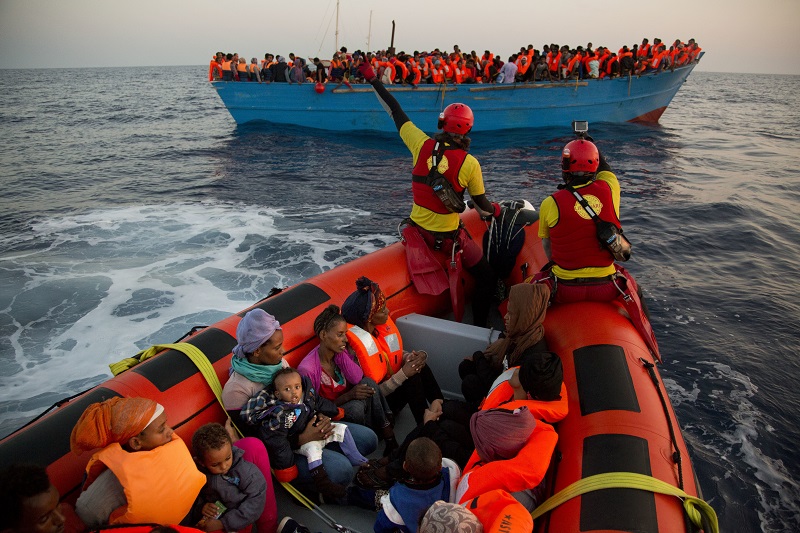

Tragedy Strikes as Migrant Boat Capsizes in the Mediterranean
The perils faced by migrants trying to cross the Mediterranean to Europe were brought to light on Wednesday as a devastating shipwreck happened off the southern coast of Greece. A big boat carrying migrants capsized in the event after allegedly refusing offers of assistance. The International Organisation for Migration (IOM) of the United Nations considers the Central Mediterranean route to be the world’s most dangerous migration route, and this tragedy serves as yet another vivid reminder of the dangers involved with it. This article addresses the most recent shipwreck, Greece’s immigration policies, the patterns of migrant arrivals in the Mediterranean, and the broader issues and divides surrounding migration within the European Union (EU).
The shipwreck occurred around 75 km (45 mi) southwest of the southern Peloponnese peninsula in Greece. Currently, 104 individuals have been successfully saved, and 79 bodies have been retrieved. Although it’s still unclear how many people are missing, early indications indicate that there may have been hundreds on board the tragic ship. If true, this occurrence would rank as the year’s deadliest maritime accident.
The boat declined aid from both coast guard and nearby merchant ships, according to the Greek coast guard. The captain of the ship said he wanted to go on to Italy. Alarm Phone, a group of activists that runs a hotline for migrant boats in danger, claimed to have spoken to people on board the boat who were in need of assistance. The ship’s skipper reportedly abandoned it before it sank, according to their report.
Bypassing Greece in favour of Italy, which provides simpler access to immigrant groups and family members in northern Europe, is the goal of many migrants. According to Greek authorities, if migrants were saved within their borders, they would have to travel through the frequently hostile Balkan nations to get to Western or Northern Europe. On the other hand, the northern route from Italy is more convenient and reachable.
Critics, such as Alarm Phone, attribute the shipwreck to Greece’s immigration policies. According to them, Athens serves as “Europe’s shield” to thwart immigration. Greek authorities, however, stand by their conduct, claiming that they followed the boat even after it declined help and that when it capsized, they began a search and rescue operation.
The majority of unauthorized arrivals in Europe this year were documented in Italy, where 55,160 people touched down. This amount is much greater than 2021 (16,737) and more than twice as many arrivals as there were during the same time period in 2022 (21,884). Ivory Coast, Egypt, Guinea, Pakistan, and Bangladesh are the most prevalent nationalities among new immigrants this year, per data from Italy’s interior ministry.
Despite a decline in overall migration, the Central Mediterranean route is still dangerous. While historically serving Syrian, Iraqi, Afghan, and other non-African migrants attempting to reach Greece or other European destinations, the Eastern Mediterranean route is now used by migrants hoping to travel from Morocco or Algeria to Spain.
At least 1,039 persons were reported missing from crossings in the Central Mediterranean in 2023, even before this most recent catastrophe. The actual number, though, is probably far higher because of unrecorded wrecks. According to IOM estimates, almost 27,000 migrants have vanished in the Mediterranean since 2014.
On April 18, 2015, and October 3, 2013, the Mediterranean had two of the worst shipwrecks in recent memory. In the 2015 event, a fishing boat carrying too many passengers collided with a ship off the coast of Libya, killing 1,100 people. Only 28 people managed to survive. A boat carrying more than 500 people collapsed and caught fire in 2013 close to the Italian island of Lampedusa. A week later, the “slaughter of children” catastrophe took place, killing over 260 people, including 60 children.
The major burden of receiving and processing migrants has long been complained about by Mediterranean nations, which have long urged other EU members to share the burden. Poland and Hungary are two examples of Eastern European countries that have continuously opposed EU attempts to more fairly spread the burden of immigration. However, recent talks towards a new migration and asylum accord have made headway.
Human rights organizations contend that the EU has delegated the Libyan coast guard to handle migrant rescues, which frequently results in the repatriation of migrants to appalling circumstances in detention facilities. Additionally, to strengthen border security and stop migrant boats from reaching European shores, the EU and its member states have entered into agreements with North African nations. These policies have led to migrants and refugees making longer and riskier journeys in search of safety.
A heartbreaking reminder of the dangers faced by migrants looking for safety in Europe comes from the recent shipwreck off the southern coast of Greece. Thousands of lives have been lost at sea via the Central Mediterranean route, which continues to be the world’s worst migration route. The episode highlights the difficulties faced by both migrants and the nations they are trying to enter, emphasising the necessity for the EU to have a comprehensive and coordinated approach to address migration successfully while giving safety and human rights top priority.
Novo Energy, the battery manufacturing initiative co-founded by Volvo Cars and Northvolt, announced that it would cut 50% of its…
The Trump administration announced a national review targeting approximately 450,000 migrant children who crossed the US-Mexico border without their parents,…
In a new effort to speed up deportation processes, the Trump administration is unveiling an unpopular application, which gives undocumented…
In a bid to advance inclusive hiring and access a larger talent pool, Deloitte has opened up multiple roles for…
At the 2025 Great Place To Work Summit in Las Vegas, Marriott's CEO Anthony Capuano showed a powerful moment that…
A new report from Save the Children and Plan International, provides an alarming description of the experiences migrant children have…
This website uses cookies.
Read More